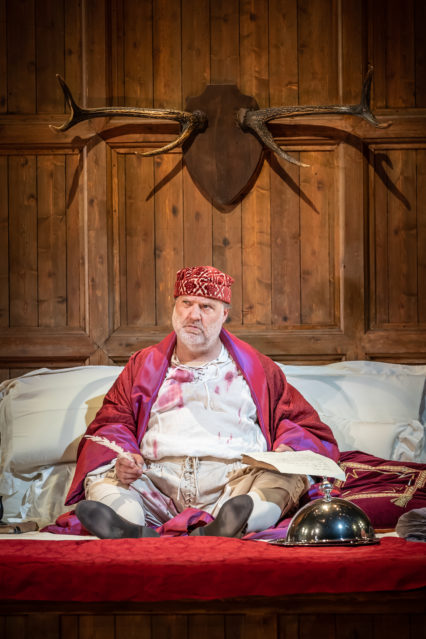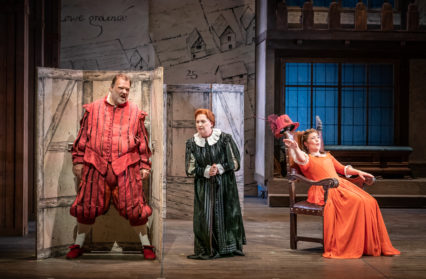Linda Christmas reviews the recent production of Verdi’s Falstaff from Grange Park Opera, which stars Bryn Terfel in the lead role alongside a number of renowned Welsh stars.
Verdi’s Falstaff is a very English opera. It was written by an Italian who so loved Shakespeare that he was enticed from retirement by the libretto. Arrigo Boito, a brilliant librettist, sensing that Shakespeare would do the trick, fileted the tedious play, The Merry Wives of Windsor, and spliced it with slivers of Henry IV. As there was a dearth of comic opera in the second half of the nineteenth century, Verdi felt it was a good moment to settle a score: his first comic opera, written in appalling circumstances immediately after the death of his wife and children, was a flop. He needed to redress and attempted to do so with this situation comedy about a fat-bellied sponger, daft enough to think that two married women might be tempted to part with their money as they gazed at his girth. And what do they do? Turn the tables and make an ass of him; not with ‘Me Too’ style venom, but with boundless humour to hide a tinge of malice.
Falstaff could be the perfect Country House opera. The show needs the intimacy of a small house, but the work can be overwhelming on first hearing as it bears little resemblance to Verdi’s previous operas. Verdi, realising that the Italian operatic style, essentially vocal, was being dented by Wagnerian, symphonic music drama, banishes his former aria-laden formula. Instead, he offers his singers a conversational, quasi-declamatory style, blossoming only occasionally into ariosos (less melodic than arias). From curtain-up (there is no overture), Falstaff races away with irrepressible energy. Appreciation of the score takes concentration: musical gems appear and quickly disappear. This is the most sophisticated ensemble opera with a wealth of duos, trios and quartets, and at one point, five men and four women sing together. It took my ears some years to ferret out the truffles and I was much helped when interviewing the late Carlo Maria Giulini, a conductor second to none in his reverence for a score that demands precision and discipline from both orchestra and singers. The reduced BBC symphony orchestra under the baton of Gianluca Marciano sounded a little timid at times, but overall made a stylish contribution. The cast appeared to relish the challenge, including three renowned Welsh singers.

Sir Bryn Terfel has the star role as Falstaff. He is a patron of Grange Opera and so loved that novelty fundraising allowed his fans to sponsor parts of his body: not just the big belly, but the arms, legs, throat and mouth. He rewarded them all with a full-hearted performance. Terfel has been singing Falstaff for twenty years and is completely at ease with the part. In this production the director, Stephen Medcalf, offers a scruffy, grubby looking Falstaff with stained clothes rather than a warrior fallen on hard times. Fortunately, he cleans up nicely when courting the merry wives. That was a relief because the libretto does refer to him as a gentleman, gallant, quick-witted and eloquent.
Jeffrey Lloyd-Roberts plays Bardolf, one of Falstaff’s entourage: a part needing character portrayal as much as vocal burnish. Lloyd-Roberts provides both. He is a polished performer (and much the most interesting commentator at Cardiff Singer of the World). Natalya Romaniw is Alice Ford, ring leader of the Windsor women bent on up-ending Falstaff. Romaniw previously declared that her Ukrainian background meant that her ‘soul is wholly Eastern European’ and her ‘affinity to the music is very strong’. This requires an emphasis on the melancholic. How, then, would she fare, away from the pain and suffering of the tragic operas in which she has appeared so far? The answer is that she did so with acclaim. Romaniw has impressive stage presence and mastered the short, staccato phrases as well as displaying command of both opulent upper and lower register.
Verdi gave Ford, David Stout, a brilliant old-Verdi moment. ‘E Sogno? O Realta’ (‘Is this a dream or reality?’) focuses on the jealousy he experiences when he thinks his wife has been unfaithful. It’s a superb moment which wouldn’t sound out of place in Otello: the words ‘Marriage is hell! Woman? A fiend! Let simpletons put trust in wives’ invited a shiver rather than a smile. I half expected the line ‘I would entrust my beer to a German, all my table to a gluttonous Dutchman, my brandy to a Turk, rather than my wife’, to be rewritten in the current climate, but it remained.
The set, designed by Jamie Vartan, is puzzling. Falstaff usually opens in the ‘Garter’ Inn, but here Falstaff appears on a large bed which would not be out of place in Rosenkavalier. Furthermore, the production makes much of ‘Robin’, a fully-armoured page, who appears all too often including a scene where he lies across the foot of Falstaff’s bed. The curtain call revealed that the page was played by a woman. This tendency to add distractions occurred again in the merry wives’ scenes, with six rows of sheets strung across the entire stage and crows on sticks bobbing up and down between them. The last scene, in Windsor Park, offered one big tree and exceptional lighting by John Bishop to create midnight magic.
Verdi ends the opera with the famous fugue: ‘Everything in the world’s a jest… we are all figures of fun’. It is designed as a resolution to all the intrigue and to bring all characters to the table for dinner. Everyone leaves. Falstaff is left shrugging at the audience. A suitable ending to encourage applause.
Falstaff is showing at Grange Park Opera in Surrey from 1st – 18th of July 2021.
Linda Christmas is a journalist and an opera devotee of fifty years.
Header image: Falstaff (Bryn Terfel), Meg (Janis Kelly) and Alice (Natalya Romaniw). Credit: Marc Brenner.











